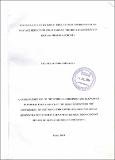| dc.description.abstract | This is a study on 'The influence of external educational environment on wastage reduction strategies of the boy child output in Kenyan primary schools'. Every time The Cabinet Secretary in the Ministry of education releases national examinations there is an outcry of marginalization of the boy child after which nothing is changes begging the question is the boy child not as a critical human resource as the girl child. The systems theory was applied in the study. The objectives of the study were to: establish the status of the boy child educational process and wastage reduction strategies between 200 I and 2008; establish the influence of policy framework on wastage reduction strategies of the boy child; establish the influence of. social cultural practices on wastage reduction strategies of the boy child; establish the influence of boarding arrangements on wastage reduction strategies of the boy child; determine the influence of teacher gender on wastage reduction strategies of the boy child; establish the influence of family background on wastage reduction strategies of the boy child; and to develop a model for wastage reduction strategies of the boy child. A descriptive survey research design was used in this research with a target population of public primary schools of more than one stream in 2001. The population comprised of 693 and a sample of was arrived at through stratified random sampling. Both descriptive and inferential statistics were used to analyze the data and hypotheses tested. Further, a regression analysis was run for the dependent variable against the independent variables. Hypotheses tests were carried out. The findings established the influence of external environment on wastage reduction strategies as having a good fit since all key statistical indices were above or below the recommended levels. The influence of external educational environment was indicated by regression model results (R2=0.587, p=0.00). The five independent variables had a significant influence on wastage reduction strategies as indicated by regression results (R2=0.62, p=0.02). Policy statements had a significant influence on wastage reduction strategies (R 2=0.59, p=O.O I), socio-cultural practices also had a significant influence on wastage reduction strategies (R 2=0.4 7, p=O.O I), boarding arrangements influence on wastage reduction strategies was at (R2=0.60, p=O.O 1 ), teacher gender influence on wastage reduction strategies was at (R2=0.3 l , p=0.03), while family background influence on wastage reduction strategies was at (R2=0.64, p=0.00). In conclusion policy statements, teacher gender, family background boarding arrangements and social cultural practices influenced wastage reduction Strategies. The findings concurred with Kibutu(2006), Kashu (2006), Omutako (2007) and De Corte (2003). The study recommended the development of policy statement for the boy child in particular among other recommendations. Areas for further research include further research to establish the age at which the boy child is most likely to drop out of school. The study established that the theory of production, retention and ansition theories are applicable to the specific case of the influence of wastage reduction strategies of the boy child output in Kenyan primary schools. | en_US |

